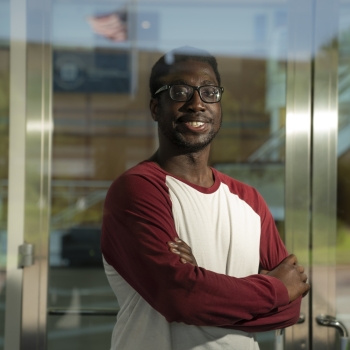Intern Spotlight: Albert Kodua designs satellite-based solution for decluttering space debris
What did you work on during your internship?
I worked with my mentor to synthesize different metals utilizing techniques in molecular beam epitaxy and thin-film deposition, and analyze different compositions of heavy metals with energy dispersive analysis. I would work with different instruments, such as a scanning electron microscope, in order to better understand the chemical composition of the compounds I create in the lab. The main application of this program is to find the material with the best optical manipulation properties in order to use the material on a space satellite in low-Earth orbit (LEO) to deflect incoming solar rays.
Did you participate in any events during your internship? How was that experience?
The I3C competition, in my opinion, was one of the experiences that I was most excited for and ultimately made me accept my Lincoln Lab internship offer. With help from Gerald Augeri from the Space Systems and Technology Division, I was able to set up a team with five other interns to help form a low-cost project that dealt with using a satellite to de-orbiting inactive satellites in LEO, leveraging current technology and commercial off-the-shelf parts. Our team ended up placing third in the competition overall; however, now our team has the opportunity to continue working on this project with the Laboratory in hopes of pitching the project to current Laboratory partners, such as DARPA, NASA, and the United States Space Force, who could help fund a full-on program. I could personally see this project coming to fruition sometime around the end of the decade or sooner, especially since the project’s concept of operations can be used for multiple areas of national defense. Overall, I think I3C is one of the best experiences I have ever had at an internship, and I would highly recommend that future interns should consider creating a team in the future.
What impact do you think your internship experience has had on you?
With this being my first in-person engineering internship, compared to the internships I had completed previously, I was excited to finally apply some of the techniques I had learned in the classroom. If anything, this internship solidified my interests in higher-level research as well as my passions for both material science and engineering and aerospace engineering. Additionally, the networking experiences, whether it be on the shuttle or at lunch, made this internship one I will never forget. Having subject-matter experts who can answer some of the world’s most complex challenges in minutes is just one of the Lab’s best qualities and a reason for me to potentially seek out a full-time position at the Lab in the future.
What are your future goals or plans?
After this summer, I know for a fact that I want to help build something that will forever change the landscape of aerospace engineering, despite being a materials engineer. That is why I was so passionate about my I3C project as it was a way to prove to myself that I could be both an effective leader and smoothly transition into learning more about aerospace engineering. As I gear up to start my master’s degree in materials science and engineering this fall at Virginia Tech, I will take what I learned this summer and apply it to my research during the school year. After the conclusion of my master’s program at Virginia Tech, I could see myself, hopefully, at MIT to get a master’s degree in aerospace engineering or working with an aerospace industry contractor, such as Lincoln Laboratory. I could also see myself working on the satellite de-orbiter my I3C team designed and actually attempting to launch and successfully de-orbit defunct satellites in LEO.
Is there anything else you would like to add?
I am here at the Lab as both an intern and GEM Fellow. Thanks to Lincoln Laboratory, I became the first person in my family to pursue graduate studies and will have my master’s degree completely paid for with the Laboratory’s help. For most of my life, I have been an advocate for increasing the number of underrepresented minorities in STEM fields. This is why I believe that programs like GEM, that help promote diversity and inclusion, are so important to continuing to creating an inviting and intellectual atmosphere within the Lab.
